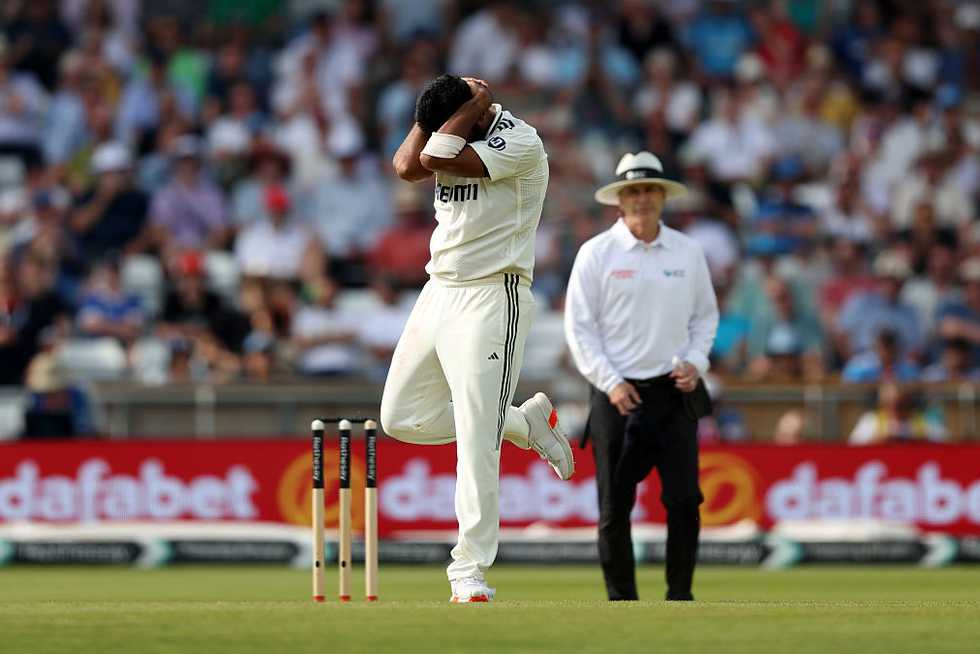

A small ritual played out repeatedly in the early moments of the post-Tea session on the second day of the Headingley Test. Each time Jasprit Bumrah walked in from fine leg to his bowling mark at the start of an over, Karun Nair would jog up and meet him halfway to take his cap and hand it to the umpire.
The game was at a delicate point, a time when superstitions can hit overdrive. England had motored off to 129 for 2, having survived one Bumrah burst before Tea under sullen skies. India's hopes of steering ahead once more hinged on their talisman's spell at the start of a session. And he nearly delivered again. Ollie Pope, on 60, was drawn into a false shot by the awkward angle Bumrah creates and the steer flew to gully, where Yashasvi Jaiswal put it down.
It was the last ball of the 31st over. When the cap was returned to Bumrah, this time directly by the umpire, he buried his face in it. No one got near him, until Rishabh Pant decided to run the long path Nair had taken all evening to offer a consolatory hug.
That passage summed up India's day. The knocks came, no one answered the door. And when they should've shut the door, they left it ajar, just wide enough for England to peek through and think of possibilities.
Because there was little room for imagination in the first three and a half sessions of the Test. At 430 for 3, India had the game by the collar. It was theirs to dictate. Then came a familiar collapse: 7 for 41, bowled out for 471 - the lowest total to feature three individual hundreds.
It should have been a statement. Instead, it became a warning, of what can happen when you leave the job half-finished against a team like England. And India have been here before. At Edgbaston in 2022, in Hyderabad and Vizag in 2024 , they had chances to bat England out of the contest. They didn't. At home, they've had the bowling to claw their way back. Away, in their current state of having no defensive edge to complement Bumrah, the margins can be thinner and the consequences sharper.
Former Liverpool boss Jurgen Klopp once spoke about the art of controlling a game. When asked to name the best playmaker, he replied, "Gegenpress". Not a footballer, but a playing style, even a philosophy: about countering the counter before it starts. That's what India needed to do here. England, under Stokes and McCullum, are built to hit back. They chase, they scrap, they don't fear the scoreboard on flat tracks. The only way to stay ahead is to shut them out early, to apply the pressure before they find their rhythm. India had a rare chance of that in the first Test of the series. They'll hope they haven't let it slip.
Still, 471 is not a small total. Sitanshu Kotak, the batting coach, called the collapse "something that can happen." Inadvertently, the collapse still gave India the best of the bowling conditions. As the promised clouds rolled in over Headingley, Bumrah stood atop his mark. He didn't need the overhead help, but made use of it anyway. The Dukes ball bent to his will. Zak Crawley didn't survive the first over. And Ben Duckett too should've gone cheaply, but Jadeja, unusually sluggish on the day, grassed a chance.
Around Bumrah, England batted as they do: fast, direct, keeping the game moving forward. Duckett got a half-century and Pope finished on an unbeaten 100. And for Shubman Gill, it was lesson one as an on-field Test captain: he will not have unlimited refills from the Bumrah well.
That distribution wasn't quite there. The third and fourth seamers, Prasidh Krishna and Shardul Thakur, conceded 79 runs in 13 overs. Prasidh, still feeling his way through just his fourth Test, kept hitting a short length on a pitch that demands slightly fuller bowling. It allowed England's batters to settle deep in the crease. Thakur didn't bowl till the 40th over and managed just three ineffective overs. Mohammed Siraj, after a tepid start and a tussle with his spikes, returned with fire in his second and third spells but remained unrewarded.
Gill had spoken about wanting to seize big moments. There were plenty on this day, with bat, ball, and in the field, but India made unforced errors on too many of them. Almost cruelly, Bumrah was summoned for one more burst before stumps. He got Joe Root,for the tenth time in Tests, and he nearly had Harry Brook too, surprising him with a sharp short ball in the final over of the day. But just when India thought they would sign off on a high, the umpire pressed his earpiece and relayed the verdict. No ball. Bumrah had overstepped.
He'd pushed too hard, a fraction too far. India were still ahead, but they could have disappeared out of sight. It was just that kind of day.





